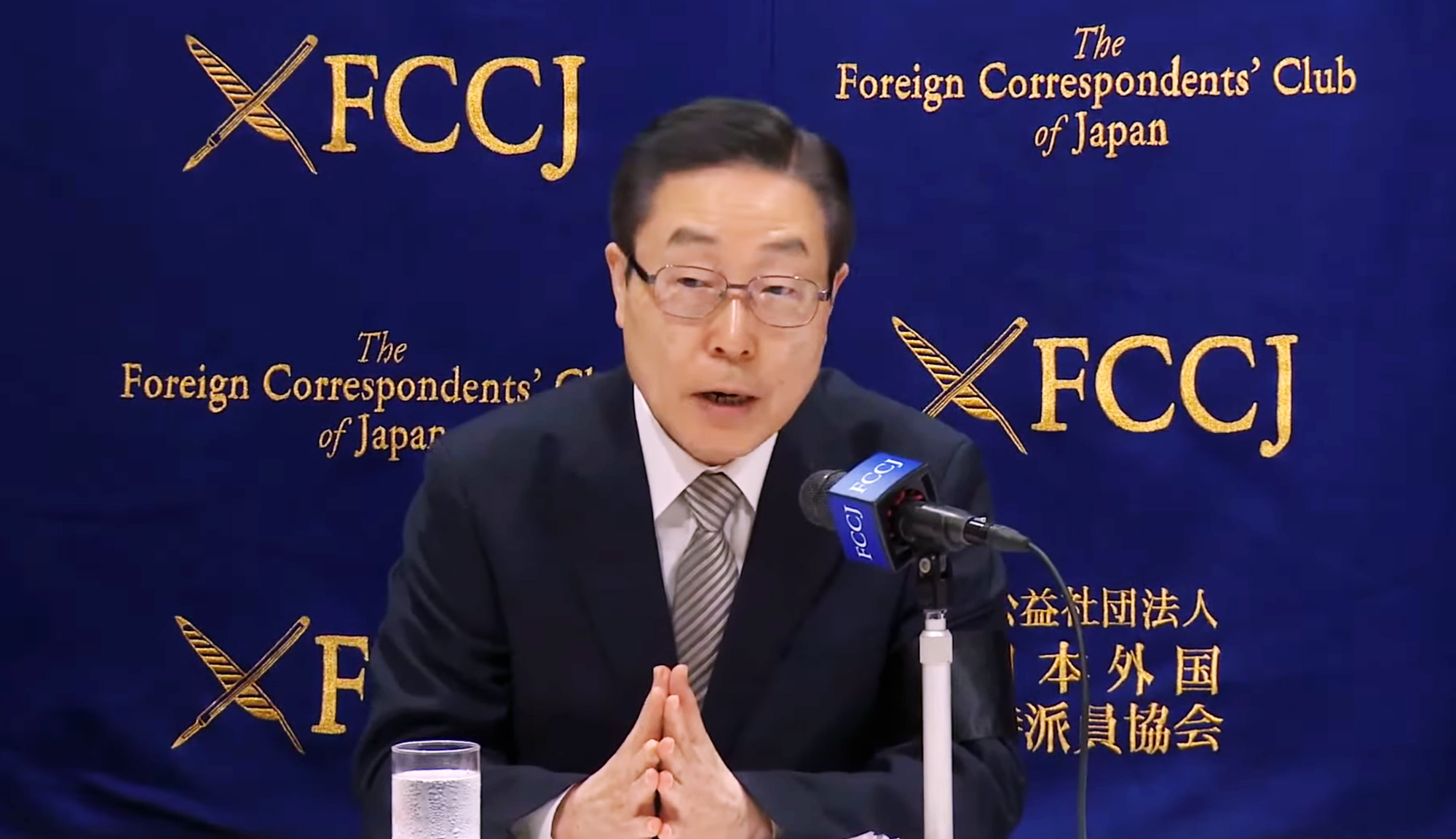Issue:
September 2022
Unification Church’s Japan head slams media at fraught FCCJ event

“Why did you express regret and apologize at the beginning of your speech, and then spend the next 40 minutes trying to give the impression you have done nothing wrong?”
This opening question, by Libération’s Karyn Nishimura, to the head of the Unification Church (UC) in Japan aptly summed up the tone of a combative FCCJ news conference on August 10.
The church, known formally as the Family Federation for World Peace and Unification, has found itself in the eye of a political storm since the suspected killer of former Prime Minister Shinzo Abe told police he had a grudge against the group. Abe and his family have links to the church, known informally as the Moonies, and now dozens of lawmakers – mostly in the ruling Liberal Democratic Party – have been found to have ties.
In an bid to get ahead of this fast moving story, Tomihiro Tanaka, president of the UC’s Japanese branch, agreed to speak at the FCCJ after several weeks of negotiation with the club.
The event was publicized just a day in advance, and the club’s front desk was inundated with calls from members and media organizations. Many were left disappointed as it rapidly filled up. Social distancing rules meant that only about 70 people were able to attend, including 15 TV crews filming the presser for the evening news.
As Tanaka, flanked by his legal chief Tatsuya Yamada, sat for photographs at the top table, journalists in the room could only speculate about what he would say.
“We offer our deep condolences on the passing of the former prime minister,” Tanaka said at the outset. “We also take this tragedy very seriously after hearing reports that the suspect who is believed to have been the shooter acted upon a grudge against the FFWPU. We would like to express our deepest regret for the concern this incident has caused to our society.”
He and Tanaka then bowed deeply to a salvo of camera flashes.
This act of contrition then turned into a 40-minute defense of the UC’s activities, littered with attacks on media coverage of the group, the lawyers of its alleged victims, and the church’s pet target: communism.
“Our churches in Japan have since been subjected to death threats, received threatening phone calls saying we will kill you, abusive language blasting loudly out of sound trucks and obstruction of assembly with some members of the media harassing ordinary members by going to their homes in the morning or even at night for interviews,” Tanaka said.
One of the biggest controversies surrounding the church are its so-called spiritual sales tactics of allegedly trapping followers into buying goods such as expensive bibles and pots they claim will bring spiritual benefits. Abe’s shooter, Tetsuya Yamagami, has blamed the church for bankrupting his family – his mother is a longtime member of the church, who reportedly sold their home to fund donations.
Tanaka claimed that such cajoling of people out of their life savings is a thing of the past, saying they have not received any consultations from Japan’s consumer watchdog about them since 2014.
The National Lawyers Network against Spiritual Sales said in a recent FCCJ news conference that it had received 34,537 consultations about UC between 1987 and 2021, with claims for damages totalling about $1 billion. Tanaka said, however, that only five cases have gone to trial so far this year, compared with 78 in 1998.
But Tanaka saved his fiercest barbs for journalists: “We strongly condemn the fake news and abusive language disseminated by the heartless media, which is hate speech that encourages religious discrimination, undermines the rights of individuals, and violates people’s freedom of religion.”
Moderator Teddy Jimbo interrupted Tanaka two or three times to push him to finish his speech to allow time for questions. On one occasion, the church leader brushed him off with a saigo made yarasete! (Let me finish!). The room groaned.
When we finally got to Q&A – there were six questions in total and a 10-minute extension, reluctantly agreed to by the speaker – journalists asked Tanaka about his group’s ties to politicians.
“While our members belong to a religious organization and are also individual citizens, we encourage them to be active in national politics and also to take part in national elections,” he said.
“Our fundamental stance is our opposition to communism,” Tanaka added. “And so from that perspective, it is likely there are more important points of encounter between politicians from the LDP, but it's not limited to the LDP. “[It’s with] politicians who take a clear stance against communism.”
The pair wrapped up with a nod to Jimbo, a bow, and a sharp exit. But on their way out, a reporter – angry at not being able to enter the room – approached them near the elevators and physically pushed them and a staff member escorting them.
An ugly end to a fraught event.
Andy Sharp is politics and economics news editor at Nikkei Asia.

